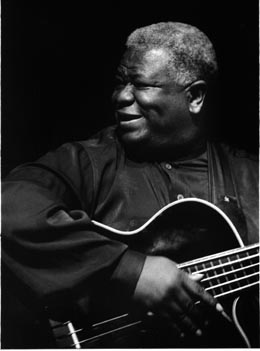 I’ve mentioned before how fortunate I feel to have got to meet so many of my musical heroes early on in my music career. Back when I was writing for Bassist magazine – and then Guitarist magazine when they were merged – I had the opportunity to hang out with and chat to so many players whose music had meant a lot to me. In some cases, they were pleasant interviews, and the players now say hi if see them at trade shows. Others are people I now class as good friends, and some I’ve had the chance to play with. After this interview with Abraham Laboriel, we played together for over an hour. (I’ve got a minidisc of it somewhere, though given that it was only a few months after I first got my 6 string fretless, I’m guessing my intonation wouldn’t be quite what it is today!) Continue reading “Abe Laboriel Snr Interview From August 2000”
I’ve mentioned before how fortunate I feel to have got to meet so many of my musical heroes early on in my music career. Back when I was writing for Bassist magazine – and then Guitarist magazine when they were merged – I had the opportunity to hang out with and chat to so many players whose music had meant a lot to me. In some cases, they were pleasant interviews, and the players now say hi if see them at trade shows. Others are people I now class as good friends, and some I’ve had the chance to play with. After this interview with Abraham Laboriel, we played together for over an hour. (I’ve got a minidisc of it somewhere, though given that it was only a few months after I first got my 6 string fretless, I’m guessing my intonation wouldn’t be quite what it is today!) Continue reading “Abe Laboriel Snr Interview From August 2000”
Fame, Fame, Fatal Fame – Michael Jackson And The Death of Global Super-Stardom
 The death of Michael Jackson – like so many celebrity deaths – has brought with it a swathe of responses, both from the public and in the media.
The death of Michael Jackson – like so many celebrity deaths – has brought with it a swathe of responses, both from the public and in the media.
Anyone who ever met him gets dragged out to talk about ‘their relationship’, and anyone remotely famous who might have a connection (be it sharing the pop-charts with him in the 80s, that they at some point in the past expressed a liking for his music, or just happen to be famous and black) is door-stepped for their comment.
It’s a fairly unpleasant media feeding frenzy, but it’s definitely serving a voracious need amongst a large section of the populus to be handed a secular liturgy for mourning the death of someone that, while insanely significant in the history of popular music, hadn’t made a notable artistic contribution in 20 years, and was written off a few years ago as a freaky paedo that many people (without any real evidence or experience of the case) thought escaped jail on a technicality…
For all those of us who hadn’t seen him live in over a decade, only listened to his older records (or not at all), and whose main month to month awareness of his was the reports of his spectacular and mind-boggling financial collapse, the emotional outpouring seems to be more an expression of 3 things:
- a desire for some kind of connection with *the thing that’s going on* – get our opinion in, be part of the public conversation, tell everyone you always thought he was a genius/freak/whatever.
- a sadness – close to grief – for our youth (a deeper expression of the same thing that drives people to watch I Love The 80s)
- a largely unarticulated – but it appears, deeply felt – sense of loss for the age when musical and media megastars could MEAN something. (Andrew Dubber mused on this on Twitter)
Michael Jackson in his day combined musical genius, innovation and fame-beyond-measure. He was a truly global phenomenon. Massive far beyond the reaches of late 70s Ameri-centric radio and the English-speaking world. Larger than life, weirder that weird, but astoundingly gifted. Ever since Off The Wall came out, generation after generation of kids have connected with his music (there’s something about his music that definitely – and in light of the court case from a few years back, disturbingly – connects with pre-teen kids more than almost any other soul/funk-based music).
His creative partnership with Quincy Jones, producer of Off The Wall, Thriller and Bad, produced some of the most iconic moments in the pop canon, but since Bad, he’s produced little that’s considered musically significant (I saw him live in the late 90s, when I interviewed his bassist, Freddie Washington for Bassist Magazine – outstanding show, but definitely all about the decade-plus old hits).
So what do we get out of grieving?
What are the questions we need to ask about the impression we had of him, the false feeling of connection we had with him as a person through his music and the press, and our complicity as part of a media-hungry world that fueled his madness (largely, it seems attributed to a seriously screwed up relationship with his dad, but made worse by his fame-neccesitated isolation).
Neverland, bubbles, oxygen-tanks, Liz Taylor, plastic surgery, llamas, friendships with kids, that documentary… A life documented like a dystopic flip-side to the Truman Show, but one that destroyed him.
At the recent UnConvention conference in Salford, I was asked at the end of our panel on being ‘outside the box’ what my one piece of advice was for musicians looking at their place in the world of music. My comment was
‘it’s more important to be nice than it is to be talented’
if becoming a ‘great musician’, and more pertinently, a ‘famous musician’ turns you into a reclusive lunatic, your priorities are screwed. Quit music, get a job in a bookshop, and leave fame to those whose narcissism is so overpowering they’ll pursue it to their own death.
Michael was rightly celebrated for his musical contribution, but his fame and its destructive influence on his life was out of all proportion to that (how could any music possibly live up to that??) – his public persona was a media-created 2-headed chimera: musical deity and social demon, invented to seed the front pages with stories between the album releases. If the next album’s a turkey, who cares, we’ve got pics of him in an oxygen tent, kissing a monkey dressed in tiny human clothes! Win!
Fame is the downside to success, and the way it removes the consequences from ones actions means that people like MJ who desperately needed help to recover from his screwed up childhood-in-the-spotlight never got it. If you’re heading towards it, in the words of Monty Python’s Holy Grail, “Run away! Run away!â€
Or, indeed, put another way:
“For what is a man profited, if he shall gain the whole world, and lose his own soul? or what shall a man give in exchange for his soul?”
Nothing is worth that.
So, commenters – fame, celebrity, talent… where does it all go from here? What does a tale like this mean for those of us working in music, and using social media to break down the myths around our lives? Is ‘accessibility’ just another myth, once you get beyond a certain as-yet-undefined number of pseudo-personal connections? Have at it!
SoloBassSteve.com = Forum 2.0
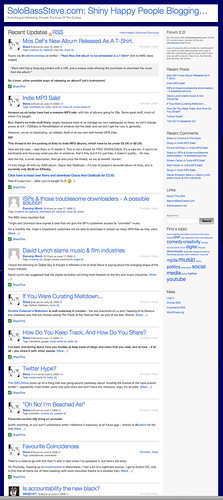 For quite a few years before all this social media stuff got properly conversational, this site was the home of a burgeoning forum. It was created in PHPBB and was home to many a wonderful discussion about all kinds of things, some of them directly related to what I was up to as a musician, but many of them just driven by the supremely fascinating people who would hang out there.
For quite a few years before all this social media stuff got properly conversational, this site was the home of a burgeoning forum. It was created in PHPBB and was home to many a wonderful discussion about all kinds of things, some of them directly related to what I was up to as a musician, but many of them just driven by the supremely fascinating people who would hang out there.
As web-based conversations moved around, Twitter became a really great place for the kind of link-sharing and funny comment stuff that was often the forum’s stock and trade, and many of the forum regulars moved over. It’s been great, and chatting to those people on a weekly-sometimes-daily basis on twitter is a wonderful thing.
But some things were also lost when the forum traffic slowed right down, namely the essays that some of the contributors would sometimes write, and the threaded conversations that would often happen as a result of a link to a news story or link to a youtube video. Continue reading “SoloBassSteve.com = Forum 2.0”
How To Respond To A Crisis. A Lesson From Sungard.
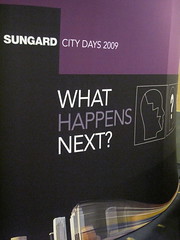 I have a friend who works in Marketing for Sungard – they’re a huge, multi-national, multi-billion dollar IT Services/financial information/Software company. Massive. Bigger than big.
I have a friend who works in Marketing for Sungard – they’re a huge, multi-national, multi-billion dollar IT Services/financial information/Software company. Massive. Bigger than big.
What interesting for us musical types is their response to the financial crisis. A situation which, naturally, they took very seriously indeed, partly because they were deeply affected, but also because it was a time when all the big finance companies were being shaken up, and previously held notions of who were the ‘big players’ could be re-jigged. It was a chance for companies to rebrand, reposition, and use the recession as a chance to do some fairly risky thinking, and ask some massive questions. Continue reading “How To Respond To A Crisis. A Lesson From Sungard.”
Ralston Bowles – The Johnny Cash of Grand Rapids
 Ralston Story I:
Ralston Story I:
When The Cheat and I first visited Grand Rapids in 2004, for Sarda and Kari’s wedding, they introduced us to their Neighbour, Ralston Bowles. As well as having an unusually brilliant name, he was introduced to us as being a singer/songwriter who works for a radio station. A description that could just as easily fit Bob Dylan these days, and one that for Ralston was as much of an understatement of what he meant to the music scene in Grand Rapids as it would be for Bobby D. Continue reading “Ralston Bowles – The Johnny Cash of Grand Rapids”
After CDs. What’s next?
 Following on from yesterday’s post about the anachronistic nature of the term ‘label’, I’ve been having a think about the actual format that music is released in.
Following on from yesterday’s post about the anachronistic nature of the term ‘label’, I’ve been having a think about the actual format that music is released in.
It’s amazing how containers can make us lazy about content. The assumptions we make about the nature of music, collections of music, what constitutes a ‘complete work’ etc.
There’s a great thread over on solobasssteve.com about this, where Tom asks about the way that downloads are allowing classical music to be consumed in the way it was intended – in mixed programmes of individual movements, or of complete works without the weird filler stuff that’s used to make up the empty bit on the CD. Continue reading “After CDs. What’s next?”
The End Of Record Labels?
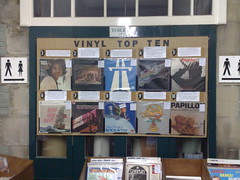 One of the most interesting things about UnConvention this weekend was the chance to listen to some people from a number of record labels talk about what they do.
One of the most interesting things about UnConvention this weekend was the chance to listen to some people from a number of record labels talk about what they do.
The thought that struck me from the discussion was that, while a lot of the work they do is still very much important and of value, the notion of ‘a label’ is stifling the reinvention of ‘companies that support the spread of music’ in the lives of musicians.
See, the term “label” suggests that there’s something physical to print a label on – that the biggest part of what they do is provide the funds and resources to record music in a studio and then release it in various containers, be they CD, vinyl, DVD or whatever… Continue reading “The End Of Record Labels?”
Brainstorming New Models for Music Careers
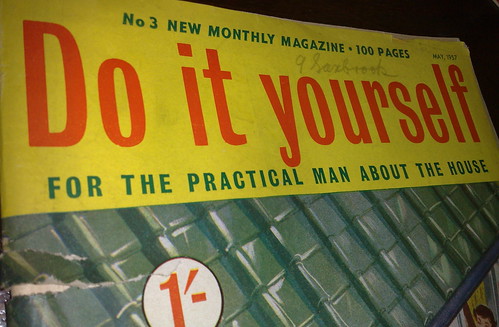 As you know, I was at Unconvention in Manchester at the weekend, on a panel titled Outside The Box.
As you know, I was at Unconvention in Manchester at the weekend, on a panel titled Outside The Box.
On the way up there, on my epically crap train journey, I wrote down a load of ideas for the session, some of which I shared, some of which there wasn’t time for – so here’s that post, as a log of some of what was said, and a bit more besides. Feel free to add your own suggestions at the end, and DEFINITELY visit Martin Atkins’ site Tour Smart website.
Continue reading “Brainstorming New Models for Music Careers”
House Consulting – Like A House Concert, But With Less Tunes And More Talking
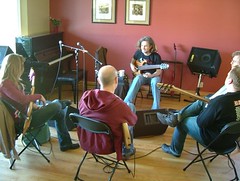 If you think back to the US tour that Lobelia and I did in Dec/January, you’ll remember that as well as gigs, we also did some masterclasses, teaching and consulting as we went round.
If you think back to the US tour that Lobelia and I did in Dec/January, you’ll remember that as well as gigs, we also did some masterclasses, teaching and consulting as we went round.
It was a whole lot of fun, and a great way to share some of what we’ve learned about social media for musicians and new ways of exploring artist-to-audience communication, without restricting it to people who were rich enough to hire us for a one-on-one session for a day. Here’s what we did: Continue reading “House Consulting – Like A House Concert, But With Less Tunes And More Talking”
Website Of the Week on 6Music Introducing!
 BBC Introducing is a cross network initiative to get unsigned music onto the air. As I mentioned in my post on ‘What Makes Your Music Interesting?‘ I’ve been talking to Tom Robinson about my music ever since we met at his event that I live-blogged at London Songwriters Week.
BBC Introducing is a cross network initiative to get unsigned music onto the air. As I mentioned in my post on ‘What Makes Your Music Interesting?‘ I’ve been talking to Tom Robinson about my music ever since we met at his event that I live-blogged at London Songwriters Week.
Well, on last night’s Introducing Show, stevelawson.net was his website of the week, and he played I’m Lost by Lobelia and I, and said some rather nice things about it.
You Can Listen to it on the iPlayer by going to the show page, and clicking on the Sunday link in the listen again menu. Continue reading “Website Of the Week on 6Music Introducing!”
